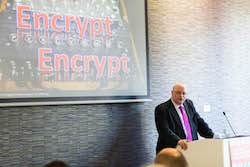
Yours truly, at IAPP 2016
Other than the title story, another, in particular, piqued my interest. Entitled “The Perfect Match”, it concerned a ubiquitous social media company called Centillion, whose motto is “make things better”, and whose modus operandi is to acquire as much information about people as possible, the better to provide the most appropriate personalized information and advice to its users.
Our hero, Sai, interacts with Centillion via Tilly, an always-on intelligent personal assistant; it features a perfect natural language user interface; and its suggestions and decisions seem to guide every aspect of Sai’s life, from the music which wakes him up in the morning, to what he wears, to the small-talk on the date which – inevitably – Tilly had arranged.
However, as he gets to know his new neighbour, Jenny, she seeks to enlighten him about the dark side of Centillion’s ubiquity. Together, they hatch a plan to sabotage Centillion’s data. So much is predictable. We have been here many times before – think Dave Eggers’ The Circle (2013) meets The Island (2005, imdb), with a side-order of Her (2013, imdb). But there are two main differences between Eggers and Liu. First, Liu is a much better writer than Eggers, so the short stories in The Paper Menagerie are much richer than The Circle. Second, just as I was beginning to think that Liu wasn’t going to offer anything much by way of novelty or insight in “The Perfect Match”, the twist in the tale undercuts everything that had gone before.
There were many benefits to the story. It was entertaining, well-written, and provocative. In Centillion, it provided me with another example of a dysagurian company, after The Circle’s eponymous leviathan, and Parks and Recreation’s Gryzzl. And it put me in just the right frame of mind for the privacy conference. There, I presented on Privacy Paradigm:
Privacy Paradigm: Toward a Creative Commons for Privacy
Privacy online is said to be in desperate straits, so threats need to be prevented (as by means of data protection regulation) and precautions need to be taken (as by means of privacy-protecting software, encryption and the like). But, before all of that, we need to respect the privacy of others. A research group in Trinity College Dublin is working on one means of signaling such respect. The working title is Privacy Paradigm, and it would be a combination of text, legal privacy policy and underlying code that would indicate to users of websites the degree of privacy protection and data processing undertaken by those sites. At present, one working analogy for Privacy Paradigm is provided by Creative Commons. They maintain their public copyright licenses in three parallel forms: standard-form human-readable language, technical legal code and powerful machine-readable code. Their elegant approach promotes a full understanding of, and encourages a culture of respect for, the nature and limits of copyright law.
Where Creative Commons provides standard-form copyright licenses, Privacy Paradigm would provide standard-form privacy policies. And where the Creative Commons licenses reflect general principles of copyright law, the Privacy Paradigm privacy policies would reflect general principles of privacy law. In particular, they would ensure compliance with the General Data Protection Regulation when it comes into force. Hence, Privacy Paradigm, as a Creative Commons for privacy, would provide a means by which a website would signal not only that it respects user privacy but also how (if at all) it processes personal data. In particular, and by analogy with Creative Commons licenses, Privacy Paradigm would maintain privacy policies in three parallel forms: standard-form human-readable language, technical legal code and powerful machine-readable code. This approach would help to promote a full understanding of, and to encourage a culture of respect for, the nature and limits of privacy online.
What I hope the audience took away:
– An appreciation that privacy is not yet dead online,
– An understanding of creative means of respecting privacy online, and, in particular
– An advance notice of a possible standard-form means of respecting privacy, compliant with the GDPR
The thumbnail at the top left of this post is a photo of me in front of slide exhorting us all to “encrypt, encrypt, encrypt” our data and our online interactions (to see a bigger version of the photo, just click on it, or here). Neither Privacy Paradigm nor encryption might prevent dysaguria, but a journey of a thousand miles begins with a single step – or, as another modern behemoth (and owner of big data miner, DunnHumby) puts it in their famous advertising slogan: every little helps. Oh, and having borrowed the to Ken Liu’s book from the library, I’m going to treat myself to it, and you should too – because, in the words of another famous advertising slogan, you’re worth it, and so is he.
4 Reply to “From Ken Liu’s perfect match, via dysaguria, to Privacy Paradigm”